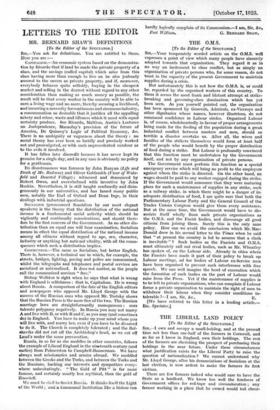THE O.M.S.
[To the Editor of the SPEcr.wron.]
Sra,—Your temperately worded article on the O.M.S. well expresses a point of view which many people have sincerely adopted towards that organization. They regard it as in no way an incitement to class conflict, but as simply an organizatibn of priVate persons who, for some reason, do not trust in the capacity of the present Government to maintain supplies during a crisis.
But unfortunately this is not how the O.M.S. is, or could be, regarded by the organized workers of this country. To them it seems the most frank and blatant attempt at strike- breaking and governing-class domination which has yet been seen. As you yourself pointed out, the organization has been sponsored by Generals, Admirals, ex-Viceroys and other dignitaries whose names, however illustrious, do not command confidence in Labour circles. Organized Labour is, of course, wholeheartedly in favour of proper arrangements being made for the feeding of the population during a great industrial conflict between masters and men, should so terrible a disaster overtake us. After all, the wives and families of the strikers themselves would form at least half of the people who would benefit by the proper distribution of food during a strike. But Labour is profoundly convinced that this function must be undertaken by the Government itself, and not by any organization of private persons.
The Government must perform this function as a special emergency service which will bring no profit to the employers• against whom the strike is directed. On the other band, no wages should be paid to any worker engaged during the strike. If the Government would announce that they were maturing plans for such a maintenance of supplies in any strike, such as a railway strike, in which there might be a danger of in.! adequate distribution of food, I am quite sure that both the Parliamentary Labour Party and the General Council of the Trades Unions Congress would give them every assistance. But at the same time, the Government would have to dis- sociate itself wholly from such private organizations as the O.M.S. and the Facist bodies, and discourage all good citizens from joining them. Surely this is the only sane policy. How can we avoid the conclusions which Mr. Mac- Donald drew in his second letter to the Times when he said that " at present the country is led to assume that a clash
is inevitable " Such bodies as the Fascists and O.M.S. must ultimately call out rival bodies, such as Mr. Wheatley has spoken of, on the Labour side. Already in cities where the Fascists have made it part of their policy to break up Labour meetings, ad hoc bodies of Labour ex-Service men have been organized to prevent such interference with free speech. We can well imagine the howl of execration which the formation of such bodies on the part of Labour would raise from the Press. Yet if the maintenance of supplies is to be left to private organizations, who can complain if Labour forms a private organization to maintain the right of men to withdraw their labour when they consider conditions in-
tolerable ?—I am, Sir, &c., E. [We have referred to this letter in a leading article.— ED. Spectator.]


















































 Previous page
Previous page